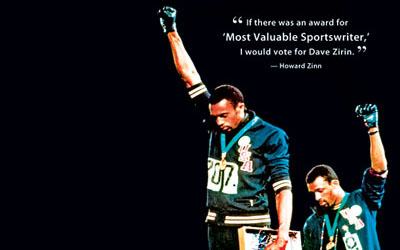
Michelle Barbero, Staff Writer |
On Wednesday, October 18, the Anthropology Department at SUNY Oneonta hosted a discussion at the Waterfront of Hunt Union, addressing the topics of politics, race, and gender in the world of sports. The conversation between students and department officials was initiated by the showing of the documentary “Not Just a Game: Power, Politics, and American Sports.”
It has long been debated as to whether or not politics belong in sports. Some believe that sports are solely about achieving successful and coordinating teamwork. As the documentary stated, it is a popular opinion that “playing the game and playing it well is all that matters.” Contrary to this opinion, others believe that it is impossible to keep politics out of sports; the two are inseparable due to inequality in the sports world.
Dave Zirin, a writer of politics and sports news, is featured in this documentary, and he conveys sports as a cultural experience and a shared social space. From its roots, sports have always reflected the hierarchical partitioning of society by race, class, and gender.
There are myths surrounding sports culture that effect the way in which people perceive sports and the people whom partake in them. One concept of masculinity is idealized, admired, and upheld in sports. To be a man, one cannot show vulnerability nor weakness. It is believed that real men are willing to make personal sacrifices for their team. Being masculine means being able to endure and inflict pain.
John J. Williams, a former American businessman and politician, explained that while competing, “you do feel like superman.”
But, despite this perception, football actually puts a serious strain on the body. Zirin pointed out that the average football player will die 20 years earlier than a person who does not play football.
Continuing in the vein of idealized masculinity, there has been a militarization of athleticism. Playing sports can be viewed as a metaphorical spectacle for fighting in a battle, which enables political conflict and patriotism to become naturalized into our society.
This potential effect also brings in question whether or not sports are sometimes used as a tool to deceive and manipulate the average U.S. citizen, but some see this way of thinking as a form of propaganda. An example that shows the potential to misuse the powerful influence sports has over people was seen in the coverage of Pat Tillman’s death. Tillman was a football player who enlisted in the U.S. Army in 2002 and later condemned the war. Fox News commemorated his death, which some people saw as a way of using Tillman’s life and position as a prominent, controversial sports figure to promote a positive association with a political agenda.
The assertion that sports is a male practice promoting masculine dominance infers that the opposition is female inferiority. The belief that women were too fragile to take part in physical activity was commonly held when schools first started administering physical education classes. Wild rumors circulated, such as that riding a bike would make a woman infertile. Some came to believe that women participating in sports was flat out un-American. But, in the 1960s, women began to change this way of thinking.
Kathrine Switzer, the first woman to run the Boston Marathon, helped to bridge the gender divide. When Switzer was being violently handled by race official Jock Semple, male racers came to Switzer’s aid to help her continue the race. Another influential athlete, former professional tennis player Billie Jean King, was able to bring feminist beliefs into the sports world and advocate for the cultivation of women’s athletic abilities.
Race remains a driving force for inequality in athletics. Minorities were at first prohibited from participating in sports, because people believed them to be biologically inferior, and therefore athletically inequipped. Muhammad Ali, a former professional boxer, was a notable activist for racial equality in sports. In part, he defined his own identity by taking on the name “Muhammad Ali” in place of his birth name, passed down by the slaveholders who named his ancestors.
As the documentary finished, a student based discussion began about today’s intersected political-athletic climate. Students shared opinions about the protests against inequality occurring during the U.S. national anthem. Despite what anyone wants, it is nearly impossible to keep sports and politics separated.
Leave a Reply